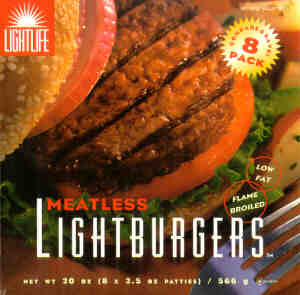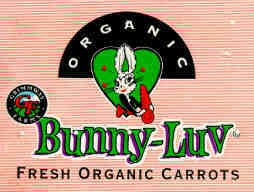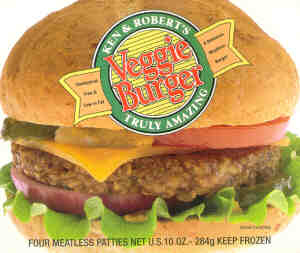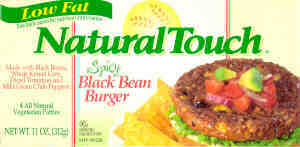 PARLIAMENTARY TRAITORS TO MEAT
PARLIAMENTARY TRAITORS TO MEAT
The General Meeting, stuffed as fully as sausage -- meat on the agenda always ensures full attendance -- began with an Open Forum complaint that neighboring firefighters have been parking on the coop's sidewalk. The coordinators (paid staff) said that they had been suffering it silently: the new traffic was from recent mourning. Lead coordinator Joe Holtz plans to request new firefighter-reserved parking spaces across the street. Firefighters are now saluted in front of the coop by a giant wood sculpture that either depicts Neanderthal firefighting heroes, or was crafted by the visually differently abled.
Bulk-food sales levels were asked of fiscal coordinator Mike Eakin. He had said at a previous General Meeting that the building expansion would mean new bulk products, even though some existing ones sold slowly. Tonight, Eakin said that 15 to 20 bulk silos would be added, and that while some current products sold well (rolled oats, for instance, "empty themselves when you turn around"), others sell only eight pounds' worth a week. Over the years, the coop has switched from many packaged to bulk items, said Eakin; for instance, years ago, organic beans were available only in packages. All of which may be true, but seven years ago the coordinators had to be ordered by a GM to add more bulk silos.
The last Open Forum speaker was the Label Guy, who had become a hit in the Linewaiter's Gazette with his articles condemning the coop's abandonment of price labels on items. But then he promoted himself obnoxiously at a previous General Meeting. At this current one, he announced he would propose at the next meeting to force item-price labeling. "This is not a time for politicking," said a cochair as the entire chair committee raggedly tried to shout him down, to which he responded by thanking everyone for their support, cards, letter, et cetera.
Eakin's financial report was informal, with only vague figures for the past sales period. But he did bring charts, one laboriously drawn on graph paper. One showed $108 million of cumulative sales since 1977. Another showed six years of 17% average annual membership growth around the previous building expansion of 1989-1991, followed by six years of 2.6% membership growth that jumped to 18% this past year.
Electromagnetic Israel, a board member and constant shill for the coordinators, was unsatisfied with Eakin's account of the coop's recovery from those six lean years. He suggested that membership growth might have grown over 20%.
Eakin said that might be true. He added that the renovation costs would mean a slight, predicted income loss till around fiscal year 2004, and that over two thousand members had joined last year. Someone asked if there was a ceiling for membership, since the coop already seems crowded at almost seven thousand members. Eakin said he didn't know what our optimum capacity was, but said that we could expand shopping hours.
Another coordinator announced the restoration of squad-leader meetings, which had been abandoned during the renovation bustle. But she said that squad leaders would not be required to attend. An audience member suggested that they should, since squad leadership is so important. The coordinator admitted that squad leaders could be bribed with makeup and FTOP credits to attend, but that forcing meeting attendance would raise the bar to a job that already too few are willing to do.
 None of the coordinators mentioned their attempt the previous weekend to have arrested a woman who, with her two kids tagging along, apparently tried to shoplift an entire cart of groceries. The staff might want to publicize such alleged thievery. For years they complained about a loss of income that suddenly changed for the better when the new checkout scanners replaced years of counting inventory by hand, not because of any obvious change in thievery.
None of the coordinators mentioned their attempt the previous weekend to have arrested a woman who, with her two kids tagging along, apparently tried to shoplift an entire cart of groceries. The staff might want to publicize such alleged thievery. For years they complained about a loss of income that suddenly changed for the better when the new checkout scanners replaced years of counting inventory by hand, not because of any obvious change in thievery.
The Genetically Manipulated Foods committee condemned the United States' attempts to "force GM foods down people's throats," and praised the communist dictatorship of China for banning some GM food. The committee said it will soon shift emphasis from lobbying Senator Schumer to lobbying for anti-GM state laws.
It was time to fight about meat. A General Meeting last year had tried to approve organic meat but had settled for a mailed referendum, which had resulted in a vote of 1,086-561 in favor of organic flesh. Defeated, some vegetarians at a later GM wanted to overrule the coop-wide vote, but were told that the GM could not overrule a referendum. In a controversial proposal that would wipe out the rest of the night's agenda, the coordinator who buys poultry and who planned to buy meat now asked permission to buy also non-certified organic, grass-fed, hormone-free meat raised by small farmers.
The referendum had simply said "organic" meat. But the coordinator, speaking very uneasily to the mob, said that she hadn't started buying it because she'd learned that it was very hard to find certified organic meat. She showed handouts carefully highlighted by hand in twenty different places, and meat-farm brochures that one audience member derided as depicting "a country club for cows."
The coordinator said that small regional meat farms aren't interested in organic certification, which is so expensive from the standpoint of federal bureaucracy and farming practices that only big agribusiness can afford it. Small organic meat farms are so limited that they can't supply the coop, she said. Organic grain, and confining animals so they won't risk eating anything but organic grain, is not only expensive for the farmer and consumer, but leads to meat that is less nutritious -- losing, for instance, healthful omega-3 fatty oils and a cancer-fighting fat. Such meat can also be more ridden with E. coli and can be less tasty. Meat animals like to munch on grass in open pastures, but such spaces are hard to keep at textbook-organic levels. Some organic meat animals can be cruelly confined for the sake of their certified-organic controlled diet.
So small producers grow non-certified organic meat, avoiding pesticides and hormones and antibiotics, and rotating their crops. Wholesalers and restaurants in the know still gobble it up. When asked about how the animals were killed, the coordinator said that small farms might have the same employees who raised the meat slaughter it kindly. "It sounds strange, but all cows need to be slaughtered," she said, getting hostile silence in response.
Many in the audience supported her proposal, favoring a "reasonably intuitive" definition of organic that would be even better for the product than the certified organic standard. Some said that the "spirit" or "intent" of the referendum, in which many members who voted for organic may not have known that "organic" was inferior to "grass-fed," would be preserved. One hungrily asked if the expanded definition would help add lamb to the shelves.
 But others opposed what one called a "rollback" of the referendum, often stridently. A General Meeting could not modify the more democratic referendum, said many. Some said that exceeded the GM's power. One said it was "insulting to the intelligence" of the referendum voters for "this small group of people" to impose its judgment. "We can't decide anything amongst ourselves," said another member who supported even more futility.
But others opposed what one called a "rollback" of the referendum, often stridently. A General Meeting could not modify the more democratic referendum, said many. Some said that exceeded the GM's power. One said it was "insulting to the intelligence" of the referendum voters for "this small group of people" to impose its judgment. "We can't decide anything amongst ourselves," said another member who supported even more futility.
Even some known meat eaters were in the opposition camp, since they were concerned less with the desirability of the product than by its legality under coop governance. In civil law, it's usually conservatives who support a strict, "original intent" approach, a strict reading of law as if it were unchanging scripture. For instance, on the federal level, original intent denies implied constitutional rights such as the right to privacy, the core of reproductive rights. At the coop, members who are conservative in coop politics tend to support the business-as-usual oligarchy of the coordinators. But tonight, the fans of original intent were the democracy-broadening liberals and radicals, people who were so in love with parliamentary rules and popular micromanagement that they'd rather sell an inferior product instead of bettering it via simpler decision making.
A few others in the opposition felt that broadening the buying policy beyond organic was simply unnecessary. One member who said her mother raised organic beef said that the coordinator's presentation was biased against organic meat farmers. The coordinator replied that the farm that the meat daughter had named was one of those unable to supply the coop. Another said that since the referendum had not guaranteed affordability, cheaper meat was not worth the price of altering the referendum vote for organic.
Holtz weighed in by saying he felt that the expanded wording would have passed a referendum by 70 percent, and that we were wasting our time, after which he instructed the chair committee in voting procedures that the committee said it already knew.
We finally read and seconded the coordinator's proposal. This formally crossed a watershed between "discussion" and "debate." We argued over whether the proposal "added to" or "expanded" the referendum decision. Some wanted to postpone a decision for months in order to increase discussion across the coop. One person was upset to learn that vegetarians were allowed to vote on this.
The proposing coordinator refused a friendly amendment to decide the issue via another referendum. So that became a hostile amendment, though at one point a similar suggestion -- to hold a referendum and to delete criticism of the referendum's dependence on the term "organic" for meat -- became a "friendly amendment to a friendly amendment." The coordinator said she rejected that unless the word "referendum" was struck. "We don't know what we're voting on," someone said. "Yes we do!" said others, backed by the now exhausted chair committee, which led a vote on whether there should be a referendum. That vote lost 23-31, with 6 abstentions.
Then a member called the question, which forced a vote to end discussion. Since that vote of 41-12 was decisive, the General Meeting could have then have simply voted on the original proposal. But the proposing coordinator decided then that it would be OK to delete the criticism of the referendum's dependence on "organic."
The confusion sent both the audience and the chair committee into cardiac arrest. After the cochairs huddled in what they called a "heated confabulation," the chair announced that it was too late for such a deletion. "You've got it really wrong," complained another coordinator, calling out from a rear row. "You're trying to make an amendment after the fact," said the chair as other voices rose. Debate is meant to improve proposals, replied the coordinator, saying that the chair committee was denying the proposing coordinator the chance to do that.
 The chair committee huddled again. The chair then announced that it was still right, but that it would allow the meeting to overrule the committee. "Any discussion?" asked the chair? The audience wailed. "We shouldn't overrule the chair," said one person. "Rules are important if you're an Arab in prison," said another. "Excuse me! Speaking!" he continued, shouting over a roomful of groans, adding that the General Meeting had no right to override a referendum and that the board of directors should consider vetoing such a vote.
The chair committee huddled again. The chair then announced that it was still right, but that it would allow the meeting to overrule the committee. "Any discussion?" asked the chair? The audience wailed. "We shouldn't overrule the chair," said one person. "Rules are important if you're an Arab in prison," said another. "Excuse me! Speaking!" he continued, shouting over a roomful of groans, adding that the General Meeting had no right to override a referendum and that the board of directors should consider vetoing such a vote.
The audience then voted 41-4, with 13 abstentions, to overrule the chair and allow the word deletion. Deep breaths. "What do you want us to discuss?" the chair asked the proposing coordinator. "Vote!" "No more discussion!" shouted the audience.
After a bit of squabbling over whether the quality of grain should be added to the proposal, the question was called again, and we voted 48-4, with 7 abstentions, to stop discussion. We then voted 38-14, with 5 abstentions, for liberalized meat-buying.
"Don't clap! We haven't any time," said the chair. There was a plastics recycling proposal also on the agenda, but its proposer said, "I don't wanna get home at 10:30," so it was tabled for the indefinite future.
The board of directors then voted 6-0 to approve not only the meat-buying decision, but also to approve the GM's decision to not hold another referendum, even though the latter decision had not been on the meeting agenda. A cochair questioned this, but Holtz said that the board must recognize the advice of the membership even if it was not an explicit agenda item.
The meeting ended with criticism and self-criticism, most loudly by coop secretary Riana McLoughlin, who called the General Meeting "arrogant" for altering the referendum decision, and predicted that when people heard about this in a couple of weeks, they'd be "very upset."
![]() Next dispatch.
Next dispatch.
![]() Previous dispatch.
Previous dispatch.
![]() Back to list of dispatches.
Back to list of dispatches.